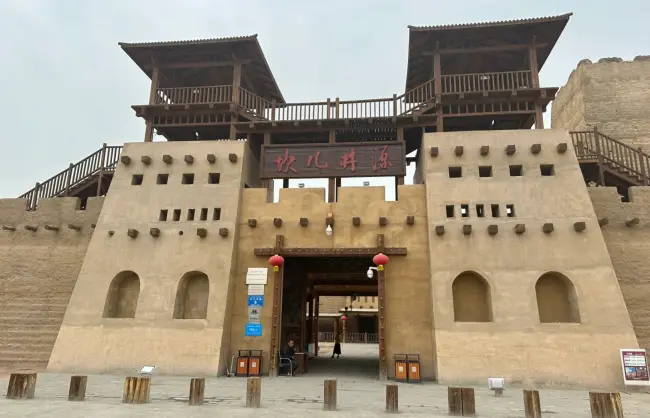The karez well system, a unique underground irrigation network, stands tall in Xinjiang trips , having braved centuries of harsh weather. Alongside the Great Wall and the Grand Canal, it’s celebrated as one of China’s ancient engineering wonders.
In Uygur, “karez” means “well,” derived from the Persian word for “channel.” This amazing underground tunnel system offers local residents a steady supply of drinking water, it also serves as an important lifeline for agricultural irrigation.
In this arid region, dominated by vast deserts, the karez well system is essential for sustaining life and agriculture.It demonstrates ancient irrigation wisdom and shows the incredible ingenuity of the Uyghur people.
Visiting the karez well system is a highlight for those touring Xinjiang, particularly Turpan. Known as the “Underground Great Wall,” it’s a treasure of Uyghur engineering, serving the land with its enduring design. Witness the wonders of this ancient engineering and admire the ingenuity that sustains this desert land.
The Karez Well System Facts
- Location:Located in Xinjiang, China,the karez well system snakes along the northern and western edges of the Taklamakan Desert.
- Ticket Price: CNY 40
- Opening Hours:Open daily, from 08:00 am to 20:00 pm
- Length: It spans an amazing 5,000 kilometers (about 3,100 miles)
- Tour Duration:A half-day trip is just right to take in all its wonders.
- Highlight Recommendations:Karez Well Museum, Exploring Underground Waterways, Karez Folk Culture Park
- Ideal For: History lovers, engineering fans, and farming friends.

What is Karez System
The karez well system in Xinjiang isn’t just for watering crops in dry places like the Turpan Basin. It also tackles the intense heat, where evaporation makes open irrigation channels a no-go. A clever new approach was needed to get mountain water to the flatlands.
It is a special underground way to water fields in Xinjiang, mainly seen in arid areas. It uses four key parts: deep wells, hidden tunnels, ground channels, and small ponds to hold water. Locals dug long tunnels underground to bring mountain water to their fields, helping with farming and keeping people and animals hydrated.
Back in the Iron Age, they used basic tools, buckets, and animals to dig and keep the karez well system in good shape, showing off their smarts and hard work. It wasn’t just vital for trade on the old Silk Road; it’s still important for watering crops today.
How karez system works
The karez well system in Xinjiang travel isn’t just about getting water to farmlands. It’s an underground network, mainly with vertical wells, tunnels, surface channels, and retention dams.
Karez water system lets people draw water with buckets from wells spaced 20 to 70 meters apart, or enter tunnels for maintenance. These wells link to tunnels that guide mountain groundwater to lower farmlands. Tunnel areas are marked by earthen mounds, like giant ant hills on the horizon.
The system design tackles rapid evaporation in Turpan’s hot, dry climate, letting water flow miles to crops. Water starts high in the mountains, flows deep underground, making tunnels long. Above ground, channels make it easy to get water for irrigation, near farms or homes. Water retention dams store water for fields, often near trees that offer extra water.
Ancient Chinese engineers built karez wells with two methods to keep tunnels straight and avoid bends that could cause problems. Without a compass, they still got tunnel directions right, bringing water to crops effectively.

What to See and Do in the Karez Well System
The Karez Well System in Xinjiang, a must-see on turpan tours , draws visitors with its smart water management and colorful Uyghur culture. Here’s a peek into discovering this incredible place.
Karez Well Folk Custom Park
- Karez Display:Walk up to the karez well system and wonder at its ancient engineering wonders
- Folklore Lane:Stroll through the charming Uyghur alleys, soaking up their unique allure.
- Vineyard Adventure:Sample juicy grapes and local delights in the vineyard, enhancing your turpan travel
Karez Well Natural Attraction
- Origin Exploration:Take an elevator 50 meters down to witness the beginning of the karez well system, experiencing nature’s wonders up close.
Karez Well Museum
- Detailed Displays:Delve into the museum’s comprehensive exhibits on the karez system, using images, models, and relics to gain insights.
- Interactive Zone:Step into the smart zone and engage with interactive displays, feeling the ingenuity of the ancient laborers behind the karez system.
Explore the Karez Well System
- Expert Guide: Join a tour of the karez system of turpanto witness its detailed design and function, marveling at its historic irrigation charm.
- Ancient Ingenuity: Throughout the visit, see the karez irrigation systemin action and admire the cleverness and hard work of ancient people that still sustain the land today
How to Get to Karez Well System
Means of transport can vary from hiring a car or taking a taxi. Turpan is a central city, thus it is readily accessible by flight or train. The driving time from Turpan city center to the karez well system is around 9.5 kilometers (5.9 miles) and takes about 20 minutes. Taxi fare is affordable, about 20 yuan.
A local guide is also advisable to make the trip even more enjoyable. They can provide useful tips on transportation and provide detailed explanations of history and architecture of the karez well system, making any china silk road tours better.
Best Time to Visit
Autumn and spring, especially from May to October, are the most suitable seasons to tour Turpan in order to experience the Karez system. While Turpan receives excessive heat and dryness throughout the year, summers in Turpan are extremely hot. However, the pleasant condition that spring and autumn provide are ideal for turpan tours.
Tourists skip the hot summer and appreciate the elegant architecture of the Karez well system from April to November. Anybody visiting Turpan owes it to himself to see the Karez system. In fact, it was crucial for the movement of water from the highland to the plain regions of the Turpan Depression. The karez irrigation system was thus devised as an innovation because ground-level irrigation was impossible under the very high evaporation and temperature.
Tourist Destinations Around Karez System
- Jiaohe Ancient City: Just 10 kilometers northwest of Turpan City is Jiaohe Ancient City. It was the ancient capital of the Cheshirian Kingdom, with a glorious history and a great culture.
- Turpan Museum: Within Turpan City proper is the Turpan Museum, which boasts a wide collection of historical artifacts and paintings. It graphically illustrates the historical transformations and cultural development of the Turpan region.
- Grandpa’s Antique Shop: Side by side with the karez well system is Grandpa’s Antique Shop, a quaint little shop that is full of antiques and artwork. From ceramics to calligraphy and paintings, jade items to bronze wares, the shop has a diverse collection of treasures.
- Grape Valley: Some 10 kilometers northeast of Turpan City lies Grape Valley, a renowned grape cultivation area in Xinjiang travel. Visitors can wander through the vineyards, learn about grape cultivation and processing, and savor fresh grapes and their derivatives.









